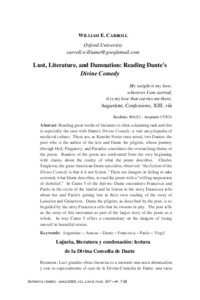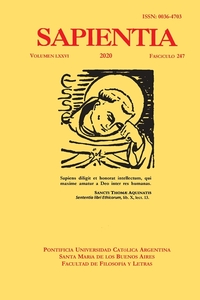Por favor, use este identificador para citar o enlazar este ítem:
https://repositorio.uca.edu.ar/handle/123456789/13401| Campo DC | Valor | Lengua/Idioma |
|---|---|---|
| dc.contributor.author | Carroll, William E. | es |
| dc.date.accessioned | 2022-02-14T12:43:05Z | - |
| dc.date.available | 2022-02-14T12:43:05Z | - |
| dc.date.issued | 2020 | - |
| dc.identifier.citation | Carroll, W. E. Lust, Literature, and Damnation: Reading Dante's Divine Comedy [en línea]. Sapientia. 2020, 76 (247). Disponible en: https://repositorio.uca.edu.ar/handle/123456789/13401 | es |
| dc.identifier.issn | 0036-4703 | - |
| dc.identifier.uri | https://repositorio.uca.edu.ar/handle/123456789/13401 | - |
| dc.description.abstract | Abstract: Reading great works of literature is often a daunting task and this is especially the case with Dante's Divine Comedy, a vast encyclopedia of medieval culture. There are, as Kenelm Foster once noted, two Dantes: the poet who is the author of the text and Dante the pilgrim, whose journey through Hell, Purgatory, and Paradise constitutes the overarching theme of the poem. Readers of the poem are confronted from the very beginning with claims about the reality of what the poem describes. Charles Singleton, the great American Dante specialist, observed: "the fiction of the Divine Comedy is that it is not fiction." There are dangers in failing to take seriously what Dante describes, to read the poem with a "willing suspension of disbelief." In Canto 5 of the Inferno Dante encounters Francesca and Paolo in the circle of the lustful and he listens to the story Francesca tells about her and Paolo's getting lost in their own reading of the story of Lancelot and Guinevere. Dante the pilgrim, as described by the poet, is so beguiled by the story Francesca tells that he swoons in pity. The poet tells us the story of this encounter as part of the larger story of the poem as a whole. In way Canto 5 offers a commentary on the dangers of losing oneself in beautiful stories. | es |
| dc.description.abstract | Resumen: Leer grandes obras literarias es a menudo una tarea abrumadora y este es especialmente el caso de la Divina Comedia de Dante, una vasta enciclopedia de la cultura medieval. Como señaló una vez Kenelm Foster, hay dos Dantes: el poeta, autor del texto, y Dante el peregrino, cuyo viaje por el infierno, el purgatorio y el paraíso constituye el tema principal del poema. Los lectores del poema se enfrentan desde el principio con afirmaciones sobre la realidad de lo que describe. Charles Singleton, el gran especialista estadounidense en Dante, observó: "la ficción de la Divina Comedia es que no es ficción". Hay peligros en no tomar en serio lo que describe Dante, en leer el poema con una "voluntaria suspensión de la incredulidad". En el Canto 5 del Infierno, Dante se encuentra con Francesca y Paolo en el círculo de los lujuriosos, y escucha la historia que Francesca cuenta sobre ella y Paolo perdidos en su propia lectura de la historia de Lancelot y Ginebra. Dante el peregrino, como lo describe el poeta, está tan cautivado por la historia que cuenta Francesca, que se desmaya de piedad. El poeta nos narra la historia de este encuentro como parte de un relato más amplio en el poema en su conjunto. De esta manera, el Canto 5 ofrece un comentario sobre los peligros de perderse en hermosas historias. | es |
| dc.format | application/pdf | es |
| dc.language.iso | eng | es |
| dc.publisher | Pontificia Universidad Católica Argentina. Facultad de Filosofía y Letras | es |
| dc.rights | Acceso abierto | * |
| dc.rights.uri | http://creativecommons.org/licenses/by-nc-sa/4.0/ | * |
| dc.source | Sapientia Vol.76, No.247, 2020 | es |
| dc.subject | LITERATURA ITALIANA | es |
| dc.subject | LITERATURA MEDIEVAL | es |
| dc.subject | POESIA ITALIANA | es |
| dc.subject | ANALISIS LITERARIO | es |
| dc.subject | DIVINA COMEDIA | es |
| dc.title | Lust, Literature, and Damnation: Reading Dante's Divine Comedy | es |
| dc.title | Lujuria, literatura y condenación: lectura de la Divina Comedia de Dante | es |
| dc.type | Artículo | es |
| uca.disciplina | LITERATURA | es |
| uca.issnrd | 1 | es |
| uca.affiliation | Fil: Carroll, William E. Oxford University; Reino Unido | es |
| uca.version | publishedVersion | es |
| item.grantfulltext | open | - |
| item.fulltext | With Fulltext | - |
| item.languageiso639-1 | en | - |
| Aparece en las colecciones: | SAP - 2020 Vol LXXVI nro. 247 | |
Ficheros en este ítem:
| Fichero | Descripción | Tamaño | Formato | |
|---|---|---|---|---|
| lust-literature-damnation.pdf | 260,28 kB | Adobe PDF |  Visualizar/Abrir | |
| cover_issue_409_es_AR.jpg | 132,87 kB | JPEG |  Visualizar/Abrir |
Visualizaciones de página(s)
90
comprobado en 27-abr-2024
Descarga(s)
289
comprobado en 27-abr-2024
Google ScholarTM
Ver en Google Scholar
Este ítem está sujeto a una Licencia Creative Commons

